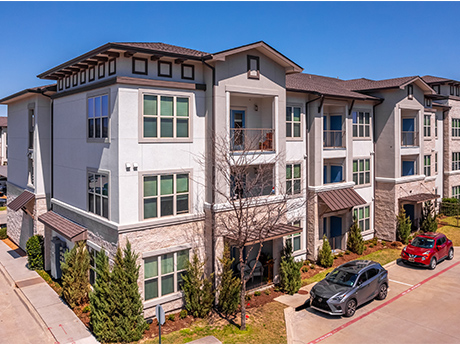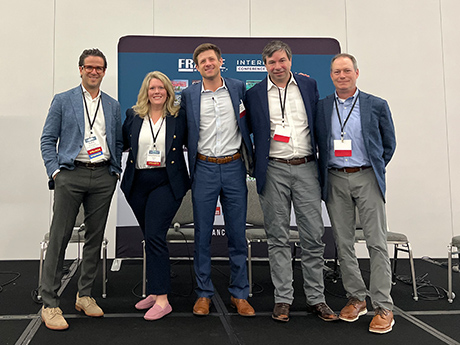ATLANTA — The investment sales market for the affordable housing sector remains muted for one overarching reason: volatility. Cory Sams, executive managing director of GREA (Global Real Estate Advisors), said that a lack of certainty, especially in the capital markets, is giving buyers and sellers of affordable housing properties pause.
“The worst thing for a deal is [interest rates] constantly moving around,” she said. “When they were running up and down, every deal fell apart.”
Doug Childers, senior managing director of JLL, estimated that affordable housing transaction volume fell 40 percent in 2023 compared with the prior year.
For context, multifamily investment sales overall declined by 61 percent year-over-year in 2023, according to MSCI Real Assets (formerly Real Capital Analytics).
Childers and Sams made their comments during the investment sales panel of Interface Affordable Housing Southeast, an information and networking conference held at the Cobb Galleria Centre in Atlanta on Thursday, May 9.
Interface Conference Group and Southeast Multifamily & Affordable Housing Business hosted the event, which drew approximately 170 industry professionals from across the region. Brian Flanagan, regional director of RBC Community Investments, moderated the investment sales panel.
Fittingly, Flanagan kicked off the investment sales discussion by asking the panelists about how volatility in the capital markets is impacting business activity. Sams said that GREA has six multifamily brokers and two affordable housing agents, all of whom were “depressed last year” because of the uncertainty in pricing for both asset classes.
“Cap rates compressed for both market-rate and affordable housing until interest rates ran up,” said Sams. “Now everybody is underwriting very conservatively, which makes it hard to make a deal.”
Indeed, the Federal Reserve did swiftly elevate the federal funds rate to the tune of 11 rate hikes over the course of 16 months between early 2022 and mid-2023.
The U.S. 10-year Treasury yield, a benchmark used to set interest rates on acquisition and refinancing loans, surpassed 5 percent briefly in October 2023 before receding. The 10-year yield jumped from 3.86 percent to start 2024 to 4.48 percent as of May 13.
Kyle Shoemaker, managing director of Affordable Housing Investment Brokerage, reminded the audience that the uncertainty over borrowing costs isn’t the sole form of volatility that affordable housing buyers are contending with.
“There are a lot of variables that have fluctuated pretty wildly in the past few years — insurance being the second major one. And general costs and inflation costs for operating are going up across all departments,” said Shoemaker.
Panelists also stated that well-capitalized investors are being very selective on their acquisitions for 2024,which is dwindling the buyer pool for affordable housing properties as they come to market.
“There have been fewer transactions largely because qualified buyers are getting a lot more careful about where they’ll put their money,” said Shoemaker.
He added that niche product in the affordable housing space, such as seniors housing, is especially tough to trade today due to the complicated nature of the property type.
“We find that the buyers that understand housing tax credits will frequently not understand assisted living, and vice versa,” said Shoemaker. “All buyers are being very selective, so having a multi-layered situation could be difficult.”
Frank McGough, the Southeast affordable housing lead at Cushman & Wakefield’s Sunbelt Multifamily Advisory Group, said that portfolio sales of affordable housing properties are also tough to execute because they require a lot of negotiations between the buyer and seller.
“The problem with portfolios is oftentimes you have bad eggs mixed in with great eggs,” said McGough. “It’s a game of give or take because the buyer wants to chip off the bad eggs from the portfolios, but that’s not what the [seller] wants.”
“The sum of the parts is greater than the whole with portfolios,” added Sams.
One common refrain during the investment sales panel was that tax abatements is a helpful tool when it comes to stimulating affordable housing investment sales. By reducing how much property tax a prospective buyer owes, the numbers on pricier transactions become much more palatable.
“Tax abatements make a difference in these deals,” said Sams. “Soft money makes a difference, and we are seeing more people look into agreements with the housing authorities. But what makes a deal work immediately is reducing the taxes.”
A recent example is the sale of Domain at Midtown Park, a 395-unit mixed-income community in North Dallas. Built in 2016, Domain at the Park offers amenities such as a pool, clubhouse, fitness center, business center, outdoor grilling and dining stations, dog park and a golf simulator.
Concurrent with the sale, the new owners — a partnership between Waterford Property Co., The Vistria Group and Northern Liberties acquiring — also entered into a 99-year ground lease with the Dallas Housing Finance Corp. to place rent restrictions on the property in exchange for a full property tax abatement for 99 years.

Of the total unit count, 51 will be set aside for renters earning 80 percent or less of the area median income (AMI). An additional 39 percent of the residences will be earmarked for households earning 140 percent or less of AMI.
Sams cited a deal that GREA is working on in which an investment firm is pledging to designate half of the units within a well-located infill property for persons earning up to 80 percent of AMI in exchange for “very affordable mezzanine debt.”
Panelists concluded that institutional buyers have largely sidelined their capital in the affordable housing sector until the macroeconomic market forces stabilize somewhat, though private and local investors are taking on the risk.
“These deals are not checking every single one of their boxes for institutional buyers,” said McGough. “We have a lot of local investors eager to enter the space and are willing to go in at a higher basis and hold onto it for a longer-term play.”
“Institutional capital is tough to get deployed because [institutional investors have] investment committees that are focused on short-term yield whereas private capital is much more patient,” explained Childers. “There is capital that wants to do deals, and we have sellers who are motivated too. We’re just trying to figure out what the new normal is right now on underwriting.”
— John Nelson


